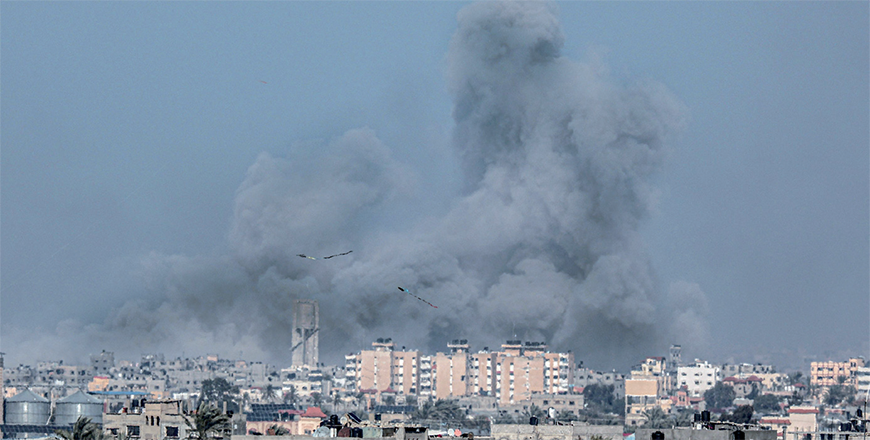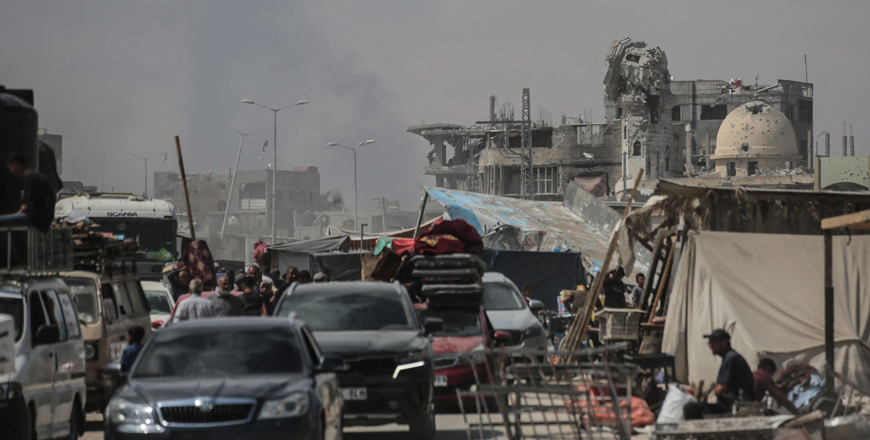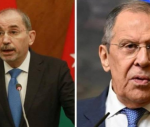You are here
US vetoes Security Council vote on Gaza ceasefire, pushes alternative
By AFP - Feb 20,2024 - Last updated at Feb 20,2024

Kites are flown over Rafah as smoke billows following Israeli bombardment on Khan Yunis in the southern Gaza Strip on Tuesday, amid continuing Israeli assault against the coastal enclave (AFP photo)
UNITED NATIONS, United States — The United States vetoed a UN Security Council resolution on Tuesday that called for an immediate ceasefire in Gaza, drawing stern criticism from allies as President Joe Biden faces mounting pressure to temper support for Israel.
Washington had circulated its own, alternative draft resolution ahead of the vote. Unlike past US efforts, that version does feature the word "ceasefire" — but with no call for it to be enacted immediately.
Tuesday's resolution, which Algeria had been working on for three weeks, had demanded "an immediate humanitarian ceasefire that must be respected by all parties".
Washington's veto was "absolutely reckless and dangerous". said Palestinian representative to the UN Riyad Mansour.
But Washington's ambassador to the UN Linda Thomas-Greenfield said that proceeding with the vote Tuesday was "wishful and irresponsible".
"We cannot support a resolution that would put sensitive negotiations in jeopardy," she said, referring to talks to free hostages in Gaza.
The veto provoked a chorus of criticism of Washington — not just from China and Russia, which have rejected the resolute US backing for Israel, but also from US allies including France, Malta and Slovenia.
“We voted for the resolution because the killing of civilians in Gaza must stop. The suffering that Palestinians are enduring is beyond anything a human being should be subjected to,” said Slovenia’s Representative to the UN Security Council Samuel Zbogar.
“The human toll and the humanitarian situation is intolerable and Israeli operations must stop,” said the French Ambassador to the UN Nicolas de Riviere.
Algeria’s Envoy Amar Bendjama said “the draft resolution would have sent a strong message to Palestinians... unfortunately the Security Council failed once again.”
“Examine your conscience, how will history judge you,” Bendjama said.
The vote came as Israel prepares to move into the southern Gaza Strip city of Rafah, where some 1.4 million people have fled, as part of its mission to destroy the Palestinian fighter group Hamas.
However as the death toll in Gaza soars, Israel is facing increased pressure to hold off, including from its closest ally the United States.
“This is not, as some members have claimed, an American effort to cover for an imminent ground incursion,” said Thomas-Greenfield ahead of the vote.
The draft resolution had opposed the “forced displacement of the Palestinian civilian population”.
It additionally demanded the release of all hostages taken by Hamas in an attack on October 7.
‘Make Israel nervous’
But the text did not condemn that assault by Hamas, which left about 1,160 people dead in southern Israel, according to an AFP tally of official Israeli figures.
Israel’s retaliatory campaign has killed more than 29,000 people in Gaza, mostly women and children, according to the latest count by the Hamas-run territory’s health ministry.
Russia’s Envoy to the UN Vasily Nebenzya said Washington’s draft text was intended to “detract attention from the latest shameful veto exercise by the US”.
The United States had warned over the weekend that Algeria’s text was not acceptable, arguing that it would endanger ongoing delicate negotiations to free the hostages in Gaza.
Instead, the alternate version offered by the US echoes recent comments by Biden, who has come under increasing pressure from his supporters ahead of November presidential elections.
It supports a “temporary ceasefire in Gaza as soon as practicable, based on the formula of all hostages being released”.
It also mentions concern for Rafah, stating that “a major ground offensive should not proceed under current circumstances”.
The US text “as it is... cannot pass”, one diplomatic source said, pointing to several issues around the phrasing of “ceasefire”.
Eyebrows were raised among some diplomats who questioned Washington’s true intent.
“Do they really want this resolution or do they want to push the other side to veto?” asked one, pointing to the likelihood of a Russian veto of any text produced by the United States.
The mere fact the United States has introduced a counter-resolution is likely to “make Israel nervous”, Richard Gowan, an analyst at the International Crisis Group, told AFP.
Related Articles
UNITED NATIONS, United States — After more than five months of war, the UN Security Council for the first time on Monday demanded an immedia
UNITED NATIONS, United States — The United Nations Security Council on Monday adopted a US-drafted resolution supporting a ceasefire plan in Gaza, as Washington leads an intense diplomatic campaign to push Hamas to accept the proposal.
RAFAH, Palestinian Territories — Street fighting and Israeli bombardment rocked Rafah in the Gaza Strip on Wednesday, residents and official















